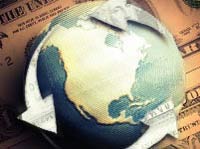US trade deficit surges a six-month high
The trade deficit rose to the highest level in six months as a big jump in oil imports offset a narrowing of the politically sensitive deficit with China.

The gap between what the United States imports and what it sells to the rest of the world rose to $63.9 billion in March, up 10.4 percent from the February level, the Commerce Department reported Thursday.
Almost two-thirds of the deterioration in the deficit reflected a 17.6 percent jump in oil imports, which climbed to $24.6 billion, the highest level in six months.
The imbalance with China fell by 6.4 percent to $17.2 billion in March, the smallest gap in 10 months as U.S. exports to China set a record. Still, for the first three months of 2007, the deficit with China ran 20.4 percent higher than the same period a year ago.
The imbalance with China hit an all-time high of $232.5 billion in 2006.
So far this year, the overall U.S. trade deficit is running at an annual rate of $722.6 billion, slightly below the $765.3 billion deficit set in 2006, the fifth consecutive record deficit.
Critics of President Bush's trade policies contend the administration has not done enough to protect American workers from unfair foreign competition from low-wage countries such as China.
Democrats used the soaring trade deficits and the loss of 3 million manufacturing jobs since Bush took office in their successful effort last year to regain control of both the House and Senate.
Worried about a protectionist backlash in this country, the administration has toughened its approach to China, but the effort may not be enough to satisfy lawmakers who are promoting legislation to penalize China for such practices as undervaluing its currency to gain trade advantages.
"Higher monthly trade deficit numbers pour more fuel on the fire burning under this administration to really do something on trade policy, especially when it comes to trade with China," said Sen. Charles Schumer, D-N.Y.
Top officials from the U.S. and China are to meet in Washington on May 23-24 for a second round of talks on various economic issues. Treasury Secretary Henry Paulson has said the administration is looking for "signposts" of short-term progress in such areas as environmental cleanup and increasing commercial flights between the two countries.
Commerce Secretary Carlos Gutierrez said Thursday the Chinese will meet behind closed-doors with key members of Congress during their Washington trip. "We want the members of the Chinese delegation to get a better sense of how our Congress works," Gutierrez said in an interview with The Associated Press.
Wall Street staged a sharp retreat on Thursday as investors reflected on the weak trade numbers and a report from the nation's retailers that their sales had been disappointing in April as consumers worried about rising gasoline prices and a continued slump in the housing marke,the AP reports.
The price of imported oil continued to climb in April, the government said in a separate report. Prices of goods imported into the U.S. rose 1.3 percent last month, led by gains in the cost of crude oil, the Labor Department said today. Prices excluding fuels rose 0.2 percent.
Shipments to the U.S. of consumer goods rose to a record $40.1 billion from $39.4 billion. U.S. consumer spending stayed strong enough in March to sustain demand for goods imported from China and other countries, economists said. Retail sales in the U.S. rose in March by the most in three months, driven by rising incomes and mild weather.
“Consumer spending will probably slow, but not by enough to take a huge chunk out of imports,” Julia Coronado, a senior economist at Barclays Capital in New York, said before the report.
Exports rose 1.8 percent to $126.2 billion in March from $124 billion a month earlier, led by record sales of industrial supplies and autos, Bloomberg reports.
Source: agencies
Prepared by Alexander Timoshik
Pravda.ru
Subscribe to Pravda.Ru Telegram channel, Facebook, RSS!




